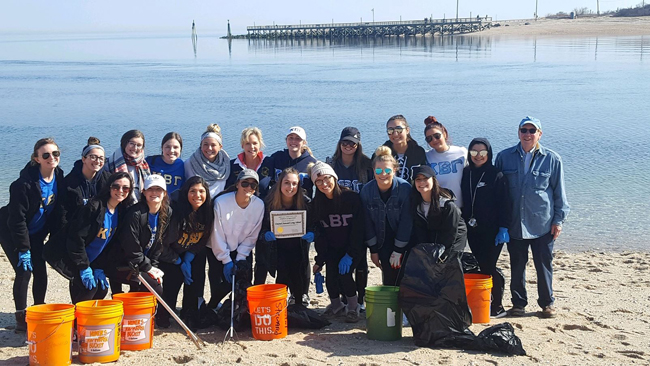
Suffolk County Legislator Sarah Anker and Stony Brook University students join Coastal Steward for a beach clean. Credit: Leg. Sarah Anker's office
— Published by Times Beacon Record
Stony Brook, NY, May 1, 2022 — In an effort to combat the impact plastic pollution has on the environment, Suffolk County has partnered with New York Sea Grant (NYSG) to publish a 15-lesson curriculum entitled, “Plastic Pollution and You.”
The curriculum was developed after the passage of Suffolk County resolution 450-2018, sponsored by Suffolk County Legislator Sarah Anker, which authorized the creation of a marine debris public awareness program.
NYSG’s Kathleen Fallon, Ph.D., a Coastal Processes and Hazards Specialist and Nate Drag, New York Sea Grant Great Lakes Literacy Specialist and Associate Director of the Great Lakes Program at the University at Buffalo, have co-authored the curriculum. Funding for the curriculum was administered by New York State’s Department of Environmental Conservation through the New York State’s Environmental Protection Fund.
“In Suffolk County, we have prioritized environmental protection through actions such as banning single-use plastic bags, personal care products with microbeads, and the release of helium balloons,” said Legislator Anker. “While legislation is an important part of environmental protection, we must also focus on educating our future generations about what they can do to reduce the negative impacts plastics can have on our water and marine life. Having sponsored the Suffolk County resolution to create the marine debris curriculum, I would like to thank New York Sea Grant, Dr. Kathleen Fallon and Nate Drag, for their work in creating this important initiative.”
“We designed the ‘Plastic Pollution and You’ curriculum with input from educators and the environmental conservation sector to prompt students to think about what plastic is, how they use plastic, and about the consequences of plastic pollution in the environment and their local communities through activities that incorporate the social, economic, and public policy context of this critical environmental issue,” said curriculum project leader Kathleen Fallon, Ph.D., a Coastal Processes and Hazards Specialist with New York Sea Grant, Stony Brook, New York.
“New York Sea Grant was pleased to provide its experience and expertise in this collaborative effort to develop a new and innovative curriculum to educate and prompt interest in reducing and preventing plastic pollution across New York State’s marine and freshwater environments — from our Atlantic Ocean shoreline and Long Island Sound to the Hudson River Estuary, St. Lawrence and Niagara Rivers, and the State’s two Great Lakes,” said New York Sea Grant Director Rebecca L. Shuford, Ph.D. “The curriculum will serve an important role to inspire the next generation of coastal stewards.”
Throughout the program, students will learn technical skills such as data collection, charting, and mapping. Additionally, students will also develop advocacy tools like position statement preparation, technical solution design, behavior change campaigns, public policy development, and community-level action strategy to address plastic pollution.
On Wednesday, April 13, teachers had an opportunity to have an introduction to the curriculum via an online workshop with the authors as well as a Sherri A. Mason, a noted freshwater plastics pollution researcher. To view the “Plastic Pollution and You” webinar or to download the curriculum, please view below or visit "NY Sea Grant Curriculum Teaches Ways to Reduce Impact".
More Info: New York Sea Grant
New York Sea Grant (NYSG), a cooperative program of Cornell University and the State University of New York (SUNY), is one of 34 university-based programs under the National Oceanic and Atmospheric Administration’s National Sea Grant College Program.
Since 1971, NYSG has represented a statewide network of integrated research, education and extension services promoting coastal community economic vitality, environmental sustainability and citizen awareness and understanding about the State’s marine and Great Lakes resources.
Through NYSG’s efforts, the combined talents of university scientists and extension specialists help develop and transfer science-based information to many coastal user groups—businesses and industries, federal, state and local government decision-makers and agency managers, educators, the media and the interested public.
The program maintains Great Lakes offices at Cornell University, University at Buffalo, SUNY Oswego and the Wayne County Cooperative Extension office in Newark. In the State's marine waters, NYSG has offices at Stony Brook University and Cornell Cooperative Extension of Nassau County on Long Island; at Brooklyn College, with New York City Department of Environmental Protection in Queens and at Cornell Cooperative Extension in NYC and Elmsford and Kingston in the Hudson Valley.
For updates on Sea Grant activities: www.nyseagrant.org has RSS, Facebook, Twitter, Instagram, and YouTube links. NYSG offers a free e-list sign up via www.nyseagrant.org/nycoastlines for its flagship publication, NY Coastlines/Currents, which is published quarterly.